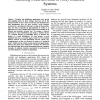Free Online Productivity Tools
i2Speak
i2Symbol
i2OCR
iTex2Img
iWeb2Print
iWeb2Shot
i2Type
iPdf2Split
iPdf2Merge
i2Bopomofo
i2Arabic
i2Style
i2Image
i2PDF
iLatex2Rtf
Sci2ools
213
click to vote
ICDE
2008
IEEE
2008
IEEE
Handling Uncertain Data in Array Database Systems
Scientific and intelligence applications have special data handling needs. In these settings, data does not fit the standard model of short coded records that had dominated the data management area for three decades. Array database systems have a specialized architecture to address this problem. Since the data is typically an approximation of reality, it is important to be able to handle imprecision and uncertainty in an efficient and provably accurate way. We propose a discrete approach for value distributions and adopt a standard metric (i.e., variation distance) in probability theory to measure the quality of a result distribution. We then propose a novel algorithm that has a provable upper bound on the variation distance between its result distribution and the "ideal" one. Complementary to that, we advocate the usage of a "statistical mode" suitable for the results of many queries and applications, which is also much more efficient for execution. We show how the...
Related Content
| Added | 01 Nov 2009 |
| Updated | 01 Nov 2009 |
| Type | Conference |
| Year | 2008 |
| Where | ICDE |
| Authors | Tingjian Ge, Stanley B. Zdonik |
Comments (0)

